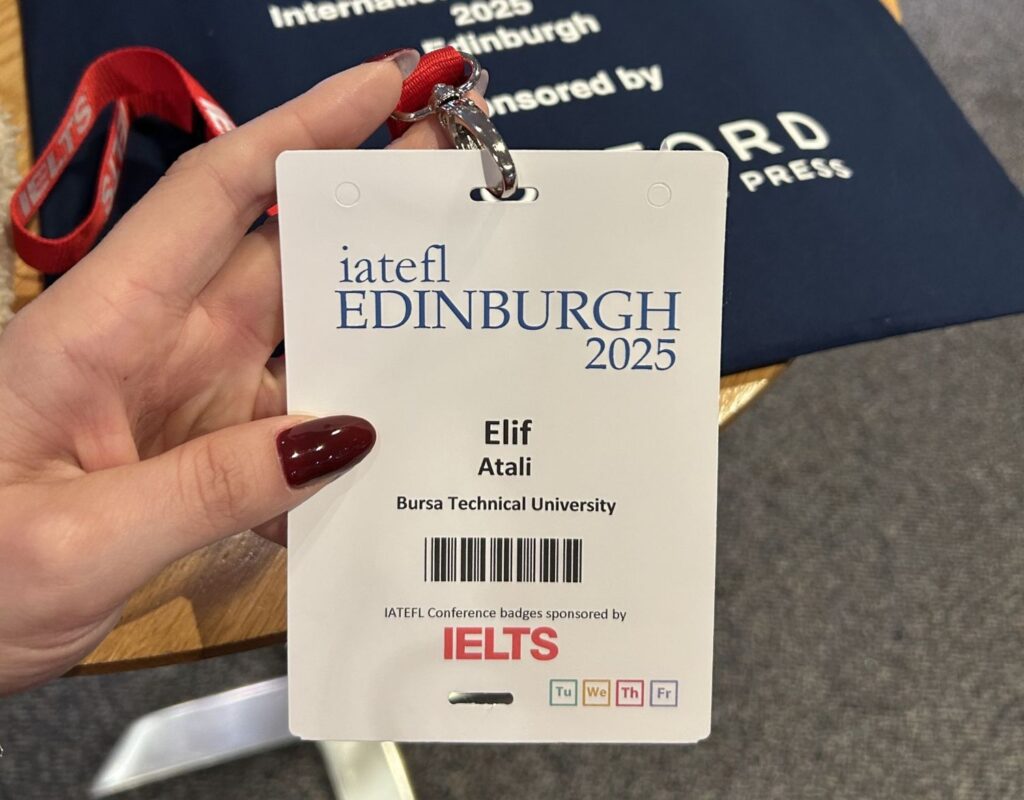Prompts for developing vocabulary materials with AI
Writing good AI prompts for developing vocabulary materials was the focus of Elif Atali’s presentation at IATEFL this year. Elif is a teacher at Bursa Technical University in Turkey and was the winner of our Lexical Lab scholarship. Here she outlines her presentation and relates her wider experiences. Over to Elif

Writing vocabulary materials with AI
My presentation explored innovative ways to enhance writing instruction through AI-driven task design, with a particular emphasis on lexical development. The session focused on how teachers can benefit from the potential of AI given the right prompting to co-create lexical materials that are contextually rich and learner-centred.
Lexical development requires revision
The core of my talk centred on how repetition supports language acquisition, a concept that has long been recognized in language teaching. Alongside this I emphasised the role of lexical chunks in language fluency in line with scholars such as Michael Lewis and his books on the Lexical Approach. Our use of AI and the way we prompt it needs to reflect these ideas.
Not just repetition but context
The traditional approach to revision in language teaching often involves drilling and rote memorization, but this simple repetition of a word or phrase may not be enough to truly internalize it. It is not just the repeating of sounds or checking of meaning that matters, but also the context in which that repetition occurs. Vocabulary becomes truly embedded in a learner’s language repertoire when it is encountered in meaningful, varied contexts that reinforce its usage. This is where the integration of AI comes into the conversation. With the right prompts AI can be a powerful tool for developing vocabulary materials that incorporate repetition without making the learning process feel mechanical or monotonous.
AI texts for vocabulary revision
Rather than creating exercises to match words to meaning, we can prompt ChatGPT to generate texts that recycle key vocabulary in various contexts, encouraging learners to engage with the same words and phrases from different angles. Instead of viewing AI as a shortcut, I suggest treating it like a potentially great teaching assistant when prompted thoughtfully.
A framework for good AI prompts
To guide teachers in crafting these effective prompts, I suggest a framework grounded in instructional clarity. This framework draws parallels between successful classroom directions and the key elements of a good AI prompt. Just as clear and structured classroom instructions are crucial, prompts for AI should also be clear, specific, and contextually relevant.
Key features of a strong prompt include:
- persona, which defines the role or perspective the AI should adopt;
- purpose, which clarifies the task’s goal; context, which sets the appropriate background or scenario;
- audience, ensuring the language used is suitable for the intended learners;
- input, which refers to the data or examples provided to the AI (e.g. key words, chunks and collocations);
- output format, specifying how the AI’s response should be structured.
From prompts to texts to tasks
Using this framework of prompts we can produce coherent AI generated texts. From these texts we can create exercises which focus on the text as a whole or draw attention to key words and their new context. We might get AI to support us in developing these tasks as well, although some may be straightforward familiar tasks like gap-fills that we create everyday.
Applying principles to other tools
Of course, the framework can apply to a variety of AI tools other than using ChatGPT for developing lexical materials. In my talk I mentioned the following:
Suno, a platform that create texts put to music.
SchoolAI, a suite of tools for creating adaptive learning materials tailored to students’ individual needs and proficiency levels.
Napkin AI allows teachers to generate custom language exercises with minimal effort – perhaps based on texts you have produced.
NotebookLM, can create detailed writing assignments with integrated feedback mechanisms.
On a personal note
Attending IATEFL 2025 in Edinburgh to give my talk on AI prompts for developing vocabulary materials was not only an honour, but also a significant professional milestone in my career. Receiving the Lexical Lab scholarship allowed me to present my work alongside distinguished educators from around the world. It was an opportunity to share my passion for language teaching and learn from the experiences of others. It also provided me with the chance to connect with like-minded professionals, exchange insights, and establish meaningful collaborations for future projects. This recognition was a reminder of the importance of continued learning and growth within the field. It was a moment of validation and reflection on how far I’ve come in my professional journey, while also igniting my passion to contribute even more to the development of language teaching practices.
From us at Lexical Lab
Thanks to Elif for doing an engaging and popular presentation on AI prompts for developing vocabulary materials at IATEFL. This is an edited version of her write-up.
Are you looking to become a trainer or presenter? Do you write your own materials? We are looking to provide more training in these areas. You can find out more here and express your interest. Here’s our current course provision.
Thanks for the lexical insights!